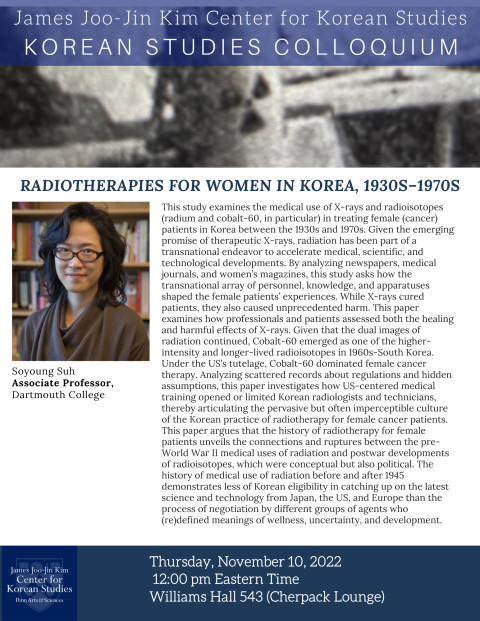
Korean Studies Colloquium
Williams Hall 543 (Cherpack Lounge)
This study examines the medical use of X-rays and radioisotopes (radium and cobalt-60, in particular) in treating female (cancer) patients in Korea between the 1930s and 1970s. Given the emerging promise of therapeutic X-rays, radiation has been part of a transnational endeavor to accelerate medical, scientific, and technological developments. By analyzing newspapers, medical journals, and women’s magazines, this study asks how the transnational array of personnel, knowledge, and apparatuses shaped the female patients’ experiences. While X-rays cured patients, they also caused unprecedented harm. This paper examines how professionals and patients assessed both the healing and harmful effects of X-rays. Given that the dual images of radiation continued, Cobalt-60 emerged as one of the higher-intensity and longer-lived radioisotopes in 1960s-South Korea. Under the US’s tutelage, Cobalt-60 dominated female cancer therapy. Analyzing scattered records about regulations and hidden assumptions, this paper investigates how US-centered medical training opened or limited Korean radiologists and technicians, thereby articulating the pervasive but often imperceptible culture of the Korean practice of radiotherapy for female cancer patients. This paper argues that the history of radiotherapy for female patients unveils the connections and ruptures between the pre-World War II medical uses of radiation and postwar developments of radioisotopes, which were conceptual but also political. The history of medical use of radiation before and after 1945 demonstrates less of Korean eligibility in catching up on the latest science and technology from Japan, the US, and Europe than the process of negotiation by different groups of agents who (re)defined meanings of wellness, uncertainty, and development.
Soyoung Suh is an Associate Professor of History at Dartmouth College. She wrote Naming the Local: Medicine, Language, and Identity in Korea since the Fifteenth Century (Cambridge, MA: Harvard University Asia Center, 2017). She is now interested in the transnational history of breast cancer, which will explore the origins of gendered medical culture in post-World War II South Korea.
 James Joo-Jin Kim Center for Korean Studies
James Joo-Jin Kim Center for Korean Studies